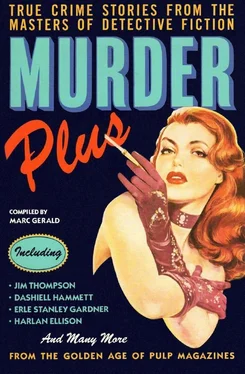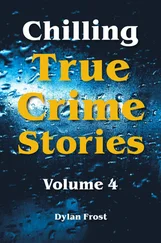Харлан Эллисон - Murder Plus - True Crime Stories From The Masters Of Detective Fiction
Здесь есть возможность читать онлайн «Харлан Эллисон - Murder Plus - True Crime Stories From The Masters Of Detective Fiction» весь текст электронной книги совершенно бесплатно (целиком полную версию без сокращений). В некоторых случаях можно слушать аудио, скачать через торрент в формате fb2 и присутствует краткое содержание. Город: New York, Год выпуска: 1992, ISBN: 1992, Издательство: Pharos Books, Жанр: Детектив, на английском языке. Описание произведения, (предисловие) а так же отзывы посетителей доступны на портале библиотеки ЛибКат.
- Название:Murder Plus: True Crime Stories From The Masters Of Detective Fiction
- Автор:
- Издательство:Pharos Books
- Жанр:
- Год:1992
- Город:New York
- ISBN:978-0-88687-662-3
- Рейтинг книги:4 / 5. Голосов: 1
-
Избранное:Добавить в избранное
- Отзывы:
-
Ваша оценка:
- 80
- 1
- 2
- 3
- 4
- 5
Murder Plus: True Crime Stories From The Masters Of Detective Fiction: краткое содержание, описание и аннотация
Предлагаем к чтению аннотацию, описание, краткое содержание или предисловие (зависит от того, что написал сам автор книги «Murder Plus: True Crime Stories From The Masters Of Detective Fiction»). Если вы не нашли необходимую информацию о книге — напишите в комментариях, мы постараемся отыскать её.
Murder Plus: True Crime Stories From The Masters Of Detective Fiction — читать онлайн бесплатно полную книгу (весь текст) целиком
Ниже представлен текст книги, разбитый по страницам. Система сохранения места последней прочитанной страницы, позволяет с удобством читать онлайн бесплатно книгу «Murder Plus: True Crime Stories From The Masters Of Detective Fiction», без необходимости каждый раз заново искать на чём Вы остановились. Поставьте закладку, и сможете в любой момент перейти на страницу, на которой закончили чтение.
Интервал:
Закладка:
“I could never quite understand,” Markham asked, “why the jury permitted Madeleine to escape with a verdict of ‘not proven.’ Perhaps it was because they could find no sympathy for the victim.”
“Don’t be so legalistic, Markham old dear,” Vance drawled. “What can one expect when a defendant is young and attractive? Even Scotchmen are of the genus masclinum... Still,” he went on, “a fascinatin’ culprit of the unfair sex sometimes gets her just desserts. For instance, there was Grete Beier — the last woman to be executed publicly in Germany. I’ve always considered the blond and toothsome Grete the most accomplished woman criminal of modern times.”
And then Vance told us the astonishing story.
Grete Beier (he began, settling himself comfortably) was a genius in both the broadest and narrowest definition of that term; for there can be criminal genius as well as aesthetic genius. Was she sane? Well, Nordau tells us that all genius is insane. But Grete was legally sane beyond any doubt. In the deeper sense, however, her sanity can well be questioned.
The fact is, Markham, that a few more, or a few less, or a few different glandular secretions might have made her a great writer, or a great musician, or even a great painter. Her talents and her imagination were misdirected.
In the field of forgery alone she was most remarkable. She could look at any person’s handwriting for a few moments, and then, through some instinctive process of memory, record the calligraphy so accurately that not even an expert could detect the imitation.
In the course of her criminal career she forged the handwriting of no less than eight different people, not once but many times; and in each instance she completely deceived the nearest relatives of her victims. These voluminous forgeries are still preserved in the German police archives, a constant source of study and amazement for the experts.
But forgery was only one of her accomplishments. After she had been arrested and accused of murder, she told a series of stories each of which was so plausible and logical, so carefully worked out to the most minute detail, that it was obvious she could have become a great writer, if she had directed only a part of her genius to literature.
Moreover, she bolstered up these stories with the most elaborate and convincing evidence, which she herself concocted. Her instinctive histrionic gifts were amazin’ — she might even have been one of the world’s greatest actresses. And her power for plotting was positively Machiavellian — the execution of her criminal acts was almost perfect.
For sheer talent and unscrupulousness, for ingenuity and boldness, for cold, calculating deviltry, for unadulterated wickedness, for subtle and farsighted chicanery, Grete was perhaps the most astounding figure of criminal history. And, as I say, she might have been a great creative artist and left us an enviable heritage of beauty, if her endocrines had been different. A staggerin’ number of books and pamphlets have been written about her by psychologists and criminologists in Europe.
(Vance lay back in his chair and blew a spiral of smoke upward.)
Marie Margarete Beier — to give this resourceful gel her full name — was born on September 15, 1885. She was the daughter of the mayor of Brand, a small town in Saxony. The upholders of the theory of heredity have long pointed to her as a triumphant vindication of their doctrines, for not only was her father a grafter and a criminal, who at the time of his death was under arrest for the embezzlement of the city funds, but her mother had been sentenced to several years in jail for abortion and perjury.
Grete’s youth appears to have been the somewhat uneventful existence of the daughter of an influential citizen in a small town. In passing, it may be mentioned that she had an extraordinary musical talent. She was an accomplished pianist and did a considerable amount of composing even as a child.
Here we have the genius motif. Perhaps if her creative will had continued to function along the lines of the tonal art... but something went awry with her internal secretions.
When Grete was sixteen, she attended a dance and met there a young man who became her beau. For several years her parents permitted their — I speak technically, of course — innocent association. Finally, though, her mother objected to the youthful swain on financial grounds.
This maternal interference quite naturally resulted in the usual clandestine meetings of the lovers; and within a few weeks Grete became the lad’s petite amie. But aside from the fact that it vexed her mother, whom she had always disliked, her Fruhlingserwachen was a dismal failure; and young Fritz — or whatever his name was — received his walking papers.
In February of 1905, when Grete was barely twenty, she met at a masquerade ball a young salesman, Hans Merker, who was destined to play an important and contemptible role in the coming tragedy of Grete’s perverted genius. And here enters Grete’s dominant sex instinct — an instinct which, Freud and Stekel tell us, is at the bottom of all creative genius. Grete and Hans were immediately attracted to each other, and a month later became secretly engaged.
In July, Merker was caught in a series of embezzlements from his employer, and Grete was able to persuade her father — who undoubtedly had some sympathy for this sort of pastime — to advance half of the stolen sum in order to save Merker from criminal prosecution. Papa Beier even went so far as to find a good position for him at the Saxonia Mines in Brand, after having extracted from him a solemn promise not to see or communicate with Grete.
Did he keep his promise? Alack for human frailty! I regret to say that Merker promptly became Grete’s lover; and that Grete rented a pied-à-terre where she could meet her adored Hans in comparative security.
This river of bliss, however, did not run a halcyon course for long. Merker, alas, was a polygamous soul, and Grete herself felt that a change of amorous association would do her no harm.
Early in 1906, just a year after her meeting with Merker, she went to another ball — this time in Chemnitz — where she met Chief Engineer Kurt Pressler. At the end of a short courtship, conducted strictly along what we euphemistically call “honorable lines,” Pressler was able to announce their engagement, the date of the nuptials being set for October, 1907.
Grete’s parents were enthusiastically in favor of Pressler, who was a quiet, studious, hard-working bourgeois Johnny in good standing. A perfect son-in-law.
But Grete, with the proverbial perversity of woman, now began to turn her eyes longingly back to Merker, who was reported to be pining away for his lost love. And in an incredibly short time her emotions for Pressler passed from tolerant affection to aversion.
Grete made various efforts to break off the engagement, but Pressler refused to be dislodged. Even when Grete prompted Merker to write to Pressler and tell him of their former relations, he clung stubbornly to his determination to marry the unwilling lady of his choice. Frau Beier assured him that her little Innocenza did not know the meaning of such things as Merker had caddishly revealed, and Pressler — staunch, trusting soul — believed her.
In the summer of 1906, Grete, having renewed her amour with Merker, became pregnant. She was elated, for she felt that now Pressler would agree to break off the engagement. She confided her condition to her mother, and was straightway advised to become Pressler’s mistress so that the joyous event could be credited — or is it debited? — to him.
Grete, who evidently was somewhat under her mother’s domination despite her antagonism for the older woman, reluctantly fell in with this plan and began seeing her loving Kurt regularly. But to her chagrin he nobly rebuffed her advances and remained to the end the chaste Teuton.
Читать дальшеИнтервал:
Закладка:
Похожие книги на «Murder Plus: True Crime Stories From The Masters Of Detective Fiction»
Представляем Вашему вниманию похожие книги на «Murder Plus: True Crime Stories From The Masters Of Detective Fiction» списком для выбора. Мы отобрали схожую по названию и смыслу литературу в надежде предоставить читателям больше вариантов отыскать новые, интересные, ещё непрочитанные произведения.
Обсуждение, отзывы о книге «Murder Plus: True Crime Stories From The Masters Of Detective Fiction» и просто собственные мнения читателей. Оставьте ваши комментарии, напишите, что Вы думаете о произведении, его смысле или главных героях. Укажите что конкретно понравилось, а что нет, и почему Вы так считаете.












